|
| |
This week in: IPSI | Africa | Americas | East Asia | Europe & Central Asia | Middle East | South Asia
|
|
|
|
| |
This week in Sub-Saharan Africa
|
|
|
|
| |
DR CONGO: Thousands flee amid surge in “horrific violence”
On Tuesday, the UN warned that the country is facing a “humanitarian disaster of extraordinary proportions,” as violence and mass displacement are rapidly rising in the country’s southeast where entrenched intercommunal conflict between several ethnic groups in Tanganyika province is triggering displacement and human rights abuses. UNHCR partner agencies documented about 800 “protection incidents” including killings, abductions, and rape, in the first two weeks of February, although much of the violence is taking place in areas that are impossible for aid workers to reach. Comment: The surge in violence in Tanganyika, an area that is home to about three million people, is largely between the Twa, Luba and other ethnic groups. Widespread militia violence has risen since President Joseph Kabila’s refused to step down when his constitutional mandate expired in 2016. (Aljazeera, UNHCR, Business Day)
|
|
|
|
|
| |
ETHIOPIA: State of emergency declared for six months
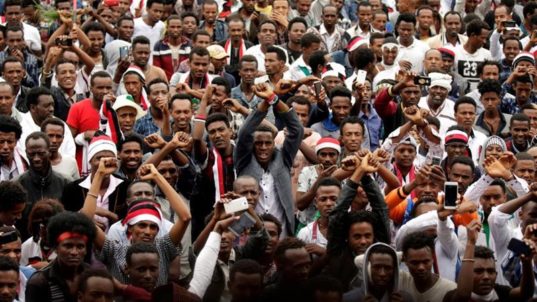
|
|
This week, officials announced that the state of emergency declared in the country after the resignation of the Prime Minister will last for six months, as the government seeks to curb political unrest amid long-standing demands for greater freedoms. The measure includes a ban on protests and the dissemination of publications that could “incite and sow discord.” It will give law enforcement officers the power to detain anyone suspected of violating “the constitutional order” and the ability to search houses, cars, and individuals, all without a court warrant. This is the second state of emergency to be declared in Ethiopia in the last two years. Comment: Earlier this month, Hailemariam Desalegn abruptly announced he would step down as prime minister and head of the ruling Ethiopian People’s Revolutionary Democratic Front (EPRDF) coalition. He cited ongoing “unrest and a political crisis” in the country as major factors in his resignation. In August 2017, Ethiopia lifted a 10-month state of emergency imposed after hundreds of people were killed in anti-government protests demanding wider political freedoms. The country’s Oromo and Amhara people – who make up about 61 percent of the population – have staged mass demonstrations since 2015 demanding greater political inclusion and an end to human rights abuses. (BBC, Aljazeera, africanews)
|
|
|
|
|
| |
SOUTH AFRICA: Death toll from listeria outbreak more than doubles to 172
| |

|
On Thursday, the government said that the death toll from an outbreak of the food-borne disease listeria has more than doubled from previous numbers given in January to 172 deaths. The National Institute of Communicable Disease (NICD) said 915 cases of the disease have been confirmed since January last year, up from the previous figures given last month of 61 deaths and 720 confirmed outbreaks. Comment: Listeriosis is caused by a bacterium found in soil, water, and vegetation. People usually contract it through animal products and fresh fruits and vegetables. The disease causes flu-like symptoms and can lead to nausea, diarrhea, infection of the blood stream and brain. It poses a higher risk for newborns, the elderly, pregnant women, and persons with weak immunity. The country’s most densely populated province, Gauteng, accounts for 59 percent of reported cases, followed by Western Cape with 12 percent and KwaZulu-Natal with seven percent. (Reuters, SBS News, FoodQuality News)
Researched/Written by Brian Adienge
|
|
|
|
|
| |
This week in the Americas & Caribbean
|
|
|
|
| |
BRAZIL: Army placed in charge of Rio de Janeiro security following surge in gang violence
On Friday, Brazil President Michel Temer ordered federal intervention into escalating conflicts in Rio de Janeiro. After hours of deliberation with other legislators, the president announced gangs have “virtually taken [control]” of the city. General Walter Souza Braga Neto of Brazil’s Military Command of the East will oversee military policing. There was dissent among Brazil’s leadership in response to the president´s decision to intervene militarily, despite Brazil’s Constitution allowing for federal intervention to maintain “national integrity.” Comment: This decision comes weeks after of violent altercations, culminating in violent gun clashes during the Rio Carnival where three police officers were killed. In the past few weeks children have been killed and highways blocked, with TV news broadcasting videos of gangs surrounding and robbing tourists. (Rio Times, BBC, Guardian, Reuters)
|
|
|
|
|
| |
UNITED STATES: Electric crews leave Puerto Rico before power is restored
On Wednesday, crews were ordered to leave Puerto Rico, as the contract to restore power expired. These efforts were part of a project to restore power to Puerto Rico with a budget of USD 750 million. A spokesperson for the contracted company, Fluor Corporation, stated that after February 26, they will be almost halving the number of workers and equipment in the territory due to loss of funding. The crews that stay in the area will work to continue to restore power as funding becomes available. Comment: With 15 percent of all costumers and dozens of communities in the territory still lacking power, the island is experiencing small community protests. Fluor expects that by the end of March, 90 to 95 percent of the territory will have power completely restored. (Islandofpuertorico, AP, ABC, WaPo)
|
|
|
|
|
| |
VENEZUELA: In effort to rescue economy, government creates cryptocurrency
On Wednesday, President Nicolas Maduro said Venezuela will launch a cryptocurrency called “Petro Gold.” This statement followed an opening day of sales for a previous cryptocurrency called, the Petro backed by crude oil reserves. Maduro tweeted on Thursday claiming the Petro generated USD 735 million in a single day. This cryptocurrency is backed by unextracted oil. Opposition leaders claim that this cryptocurrency is illegal debt issuance, while experts are wary it will not attract the needed attention due to Venezuela’s lack of financial transparency. Comment: Facing sanctions from the United States, the Venezuelan president claims these cryptocurrencies will attract interest and investment from Middle Eastern countries and China – strengthening the Venezuelan economy. (Venezuelanalysis, Aljazeera, Antigua Observer, NY Times, Reuters)
Researched/Written by Connor Murnane
|
|
|
|
|
| |
This week in East Asia & Pacific
|
|
|
|
| |
CAMBODIA: Japan extends support for Cambodian election despite legitimacy concerns
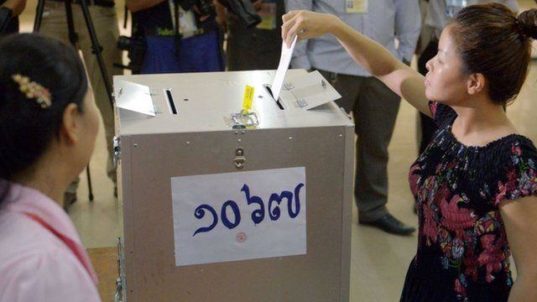
|
|
On Wednesday, Japan donated ballot boxes worth USD 7.5 million to Prime Minister Hun Sen’s government for the upcoming July elections. Japan’s assistance is the first instance of international electoral support since the European Union and the United States withdrew their funding last year in December, following the dissolution of Cambodia’s main opposition party, Cambodia National Rescue Party (CNRP). Speaking at the signing ceremony, Japanese Ambassador Hidehisa Horinouchi said Japan will continue funding Cambodia’s future elections in support of Cambodia’s democracy. Cambodia’s Foreign Affairs Minister Prak Sokhonn expressed gratitude, calling Japan a “good friend.” Comment: Human rights groups and the daughter of jailed CNPR opposition leader had previously urged foreigner donors, including Japan, to halt their electoral assistance to the Cambodia’s National Election Committee. Local human rights activists have also questioned Japan’s aid, urging the country to explain its support to what they called an “artificial election.”. (Reuters, The Phnom Penh Post, U.S. News and World Report)
|
|
|
|
|
| |
NORTH KOREA: New report reveals sophisticated North Korean cyber-espionage unit
On Tuesday, FireEye, a U.S. private security company, reported that it has confirmed that a cyber-espionage unit in Pyongchang is using more advanced technology to widen North Korea’s spying operations. FireEye’s report has named the cyber-espionage unit “APT37” and stated that the unit has existed since 2012. The unit’s operational areas include South Korea, Japan, Vietnam, and the Middle East and has attempted to steal valuable information from chemical, manufacturing, electronics, aerospace, healthcare, and automotive companies. Comment: In 2015, South Korea claimed that North Korea had increased the size of its “cyber-army” to more than 6,000 people for broader international operations. (The Guardian, SCMP, WSJ, Reuters)
|
|
|
|
|
| |
PHILIPPINES: United Kingdom supplied the Philippines with spy equipment used in its “war on drugs”
| |
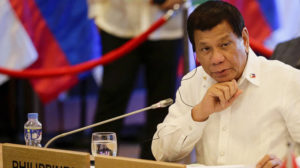
|
On Wednesday, reports surfaced accusing the UK government of selling spy equipment to President Duterte’s government, despite international awareness of human rights abuses in the Philippines. The equipment, including IMSI-Catchers and surveillance tools, are believed to have been used in Duterte’s “war on drugs” to eavesdrop on telephone conversations and monitor internal activities. Member of parliament Lloyd Russell Moyle, a member of the committee on arms export controls, said that the reports expose the UK arms export regime, which he argued continues “failing in its basic legal duty” according to UK laws. Comment: The allegations come just weeks after the International Criminal Court announced its probe to determine whether the gravity of crimes in Duterte’s “war on drugs” fall under its jurisdiction. UK laws explicitly prohibit and forbid any export that “might be used for internal repression.” (The Guardian, SCMP, Iran Press)
Researched/Written by Edgar Peter Mutta
|
|
|
|
|
| |
This week in Europe & Central Asia
|
|
|
|
| |
FRANCE: Government proposes strict immigration laws
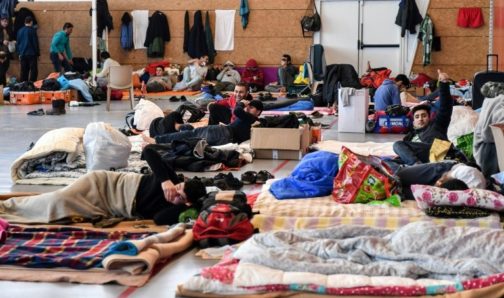
|
|
On Wednesday, a controversial bill was presented by the French government that proposes shortening the length of asylum application processing from 11 to six months, whereas migrant processing in detention centers will take double the amount of time it currently requires – 90 days. Anyone who crosses France’s borders illegally will now be jailed for one year. Staff at the asylum court and refugee protection office led strikes the same day to show their disapproval of France’s change of position on refugees. The bill has resulted from Macron’s pledge to grant asylum at a faster rate – while creating stricter laws regarding economic migrants after France received more asylum seekers last year than ever before (100,000). Macron faces opposition from both sides of the political spectrum on these new policies, even within his party. Interior Minister Gerard Collomb called the bill “balanced” because it aims to expedite refugee entry, while also deporting economic migrants. Comment: Centrist leader Macron was elected in May over a far-right opponent, and his coalition government consists of left-wing and right-wing party members who, until this point, have been generally united. The government previously proposed another bill that would have deported migrants to a “safe” country but was later removed. (The Local France , France 24 , Agence France-Presse, Reuters)
|
|
|
|
|
| |
UKRAINE: Current president testifies at former president’s treason trial
On Wednesday, Ukrainian President Petro Poroshenko testified by video conference in the state treason case against former President Victor Yanukovych. Poroshenko called his participation in a trial “unprecedented,” but wanted to assert his desire for investigating crimes associated with the Revolution of Dignity and to point out Russia’s aggressive behavior against the country. Fourty-four other prosecution witnesses have been questioned, including the major leadership of Ukraine. The trial surrounds the Revolution of 2014 (also called the Maidan events) in which peaceful protests turned violent after Yanukovych decided not to sign the Association Agreement with the EU, which would have provided better relations between Ukraine and the EU. Yanukovych fled Kiev for Russia and Crimea was, subsequently, annexed in March 2014 in a hybrid war. Comment: This trial takes place four years after the alleged treason, as well as during the commemoration of surrounding a new Ukrainian holiday on February 20 in remembrance of those who died in the protests and the Crimean crisis. (UNIAN , Kyiv Post , Interfax-Ukraine, Radio Free Europe/Radio Liberty)
|
|
|
|
|
| |
REGIONAL: Albanian prime minister criticized for suggesting a joint presidency with Kosovo
| |
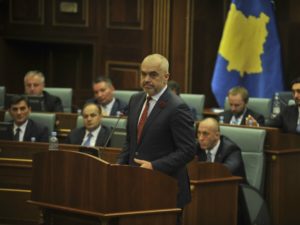
|
On Sunday, at the Kosovo parliament’s celebration of the tenth anniversary of its declaration of independence, Albanian Prime Minister Edi Rama suggested that Albania and Kosovo could have a joint president in the future. Rama has made similar statements in the past, citing that both countries contain ethnic, diplomatic, religious and linguistic connections. European Commission spokeswoman Catherine Ray said that Rama’s suggestion of interference in Kosovo could dissolve relations with other Balkan countries, in addition to hindering both countries’ pursuits of EU membership; however, Rama’s comments indicate frustration from both countries on the slow progress on EU integration. Nenad Popovic, Serbia’s Minister without portfolio, said Rama’s statement confirms long-held Serbian beliefs that Albania plans to create a “Greater Albania,” although the Albanian and Kosovo governments have denied these claims in the past. Comment: 10 years after Kosovo’s formal declaration of independence, Serbia has yet to recognize Kosovo’s independence from the country. Rama’s statement occurred two weeks after the EU produced an outline of Balkan integration into EU. New Europe reported that the “Greater Albania” nationalist concept is dangerously similar to the “Greater Serbia” concept of Yugoslav leader Slobodan Milosevich of the 1990s. (Balkan Insight , Deutsche Welle , New Europe, Radio Free Europe/Radio Liberty)
Researched/Written by Daniel Boerger
|
|
|
|
|
| |
This week in the Middle East & North Africa
|
|
|
|
| |
EGYPT: Police detain ex-presidential candidate Abul Fetouh
On Thursday, Egyptian police arrested Abdel-Monaem Abul Fetouh, president of the Strong Egypt political party and former presidential candidate. The arrest ocurred shortly after he criticized President Abdel Fattah al-Sisi during television interviews in London. The prosecution released a statement that he will be detained for two weeks, pending investigation. Last month Abul Fetouh was among several high-profile Egyptians calling for a boycott of the presidential election planned for March 2018. Comment: Abul Fetouh came fourth in the presidential elections in 2012 with more than four million votes. According to local and international rights groups, Abul Fetouh’s detention is the latest development in the government’s crackdown on dissent ahead of next month’s presidential election. (Aljazeera., VOA , Reuters)
|
|
|
|
|
| |
SYRIA: UN Security Council discusses a temporary ceasefire for Eastern Ghouta region
On Wednesday, Kuwait and Sweden called on the United Nations Security Council to impose a 30-day halt on the fighting in the rebel-held Damascus suburb. If agreed, the ceasefire would allow for the delivery of critical supplies and the evacuation of the wounded. The Syrian Observatory for Human Rights said on Thursday that 335 people had been killed, including 79 children and 50 women, with 1,745 more injured since Sunday evening in Eastern Ghouta. Comment: Forces loyal to President Bashar al-Assad have been besieging nearly 400,000 civilians trapped inside Eastern Ghouta for years, but the siege has tightened this year, and attacks on the enclave have intensified. UN High Commissioner for Human Rights Zeid Ra’ad al-Hussein called the air attacks and artillery fire a “monstrous campaign of annihilation.” (Aljazeera, CNN, Reuters)
|
|
|
|
|
| |
PALESTINE: President Abbas calls for international peace conference at UN Security Council
On Tuesday, Palestinian Authority President Mahmoud Abbas spoke for the first time at the UN Security Council since 2009. During the speech, he called for an international peace conference to take place by mid-2018 to discuss key goals including full UN membership for the state of Palestine and a time-frame for resolving all issues with Israel with a two-state solution. U.S. Ambassador to the UN, Nikki Haley, commented on the speech stating that, “The UN spends an altogether disproportionate amount of time on Israeli-Palestinian issues.” Comment: Abbas announced that the Palestinians will no longer work with an American-dominated peace process and called for the creation of an alternative peace process to replace it. This stance comes after President Donald Trump’s decision to recognize Jerusalem as Israel’s capital with plans to relocate the U.S. Embassy. (Aljazeera, BBC, CBS NEWS)
Researched/Written by Mohamed Ismail
|
|
|
|
| |
AFGHANISTAN: Provincial governor disregards president’s request to step down
On Sunday, during a televised statement, governor Abdulkarim Khaddam of the northern province of Samangan, refused to step down following President Ashraf Ghani’s request for his resignation. This comes two months after another governor, Atta Mohammad Noor, from the neighboring Balkh province rejected an order from the president that he step down from the position he has held for 13 years. President Ghani’s aides stated that the request for governor Noor’s resignation stems from his continued disrespect of the central government. Moreover, governor Noor is one of the most senior politicians in an opposition party and a potential rival to President Ghani in next year’s presidential election. On Tuesday, Khaddam agreed to resign under a deal placing him on the High Peace Council – a body set up to handle reconciliation efforts with the Taliban. Comment: Khaddam and Noor are both members of the Jamiat-i Islami political party. Balkh is one of the richest provinces in the country and has key trade routes into Central Asia, while Samangan, a mountainous and less developed region, has little strategic importance. (Afghanistan Times, The New York Times, Reuters, 1, 2)
|
|
|
|
| |
MALDIVES: State of emergency extended by 30 days
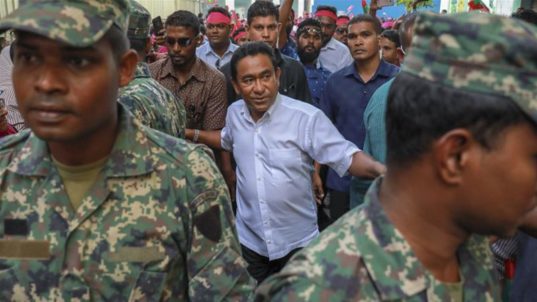
|
|
On Tuesday, parliament approved a 30-day extension of the 15-day state of emergency issued by President Abdulla Yameen on February 5. Yameen initiated the 15-day state of emergency, citing threats to national security after the Supreme Court overturned criminal convictions against nine of his opponents. The state of emergency was set to expire on Tuesday; however, on Monday, President Yameen asked parliament to prolong it “due to the present threat to national security and constitutional crisis” caused by the Supreme Court ruling. The opposition boycotted Tuesday’s vote, and the emergency extension was approved, with 38 parliament members from the ruling party voting in favor. The opposition stated that the extension was “illegal and void” because the constitution requires 43 members of the 85-member house to be present when voting on a matter of public compliance. Comment: According to two senior officials from the Prosecutor General’s office, the prosecutor general, Aishath Bisham, sent a letter to the police stating that the state of emergency extension was unconstitutional. (Maldives Independent 1, 2, The Indian Express, Aljazeera, Reuters)
|
|
|
|
|
| |
PAKISTAN: Top official attends FATF meeting to keep Pakistan off watch list for terrorist financing countries
| |
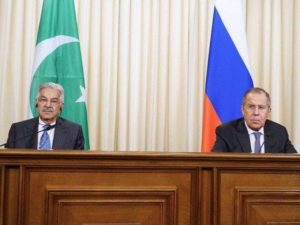
|
On Tuesday, a meeting of the Financial Action Task Force (FATF) took place in Paris to consider placing Pakistan on a watch list of countries that provide financial assistance to terrorist groups. According to Pakistan’s Foreign Minister Khawaja Asif, who was sent to plead Pakistan’s case, no consensus was reached at the meeting for nominating Pakistan. FATF member states met this week in Paris to decide on a U.S. motion, backed by the UK, France, and Germany, to have Pakistan added to the list of countries that are not doing enough to comply with terrorist funding regulations. Asif also stated that the FATF member states proposed a three-month pause and asked for the Asia Pacific Group, which is part of FATF, to consider another report in June. Comment: FATF is a global body that combats terrorist financing and money laundering. In January, the U.S. government suspended financial aid to Pakistan, arguing that the country needs to take action against terrorist groups they believe enjoy safe haven in the country. (The Daily Mail, The Express Tribune, Hindustan Times, Reuters)
Researched/Written by Pamela Mhute
|
|
|
|

|
|